Second International Workshop on Skill Science
Associated with JSAI International Symposia on AI 2015 (IsAI-2015)
Record of SKL 2015
We held Second International Workshop on Skill Science as below:
- Date:November 18, 2015
- Venue:Raiosha Building, Keio University Kanagawa, Japan (
 access)
access) - Lines: Tokyu-Toyoko line, Tokyu-Meguro line, Yokohama Underground Green line
- The workshop is held as part of
 JSAI International Symposia on AI
JSAI International Symposia on AI
- The workshop is held as part of
- Proceedings (
 pdf: 56 pages, 3MB
pdf: 56 pages, 3MB - Invited lecture: Prof. Nonaka Tetsushi (Kobe University)
- Ecology of skills: How do we control the encounters with the environment?
- (see below for more detail)
Aims and Scope
Human skills involve well-attuned perception and fine motor control, often accompanied by thoughtful planning. The involvement of body, environment, and tools mediating them makes the study of skills unique among researches of human intelligence. The symposium invites researchers who investigate human skills and provides them with a place for exchange and discussion. The study of skills requires various disciplines to collaborate with each other because the value of skills is not determined solely in terms of efficiency, but calls for consideration of quality. Quality resides in person and often needs to be transferred through apprentice systems. The procedure of validation is strict, but more complex than scientific activities, where everything needs to be described by referring to data. We are keen to discussing the theoretical foundations of skill science as well as practical and engineering issues in the study.
Topics
We aim to invite wide ranges of investigation into human skills, from science and engineering to sports, art, philosophy, anthropology, whatever concerns cultivating human possibilities. We welcome both theoretical and practical studies of human skills. We are keen to enabling for dialogue among researchers with different backgrounds given its interdisciplinary nature of the target. We welcome contributions from practicians as well as those from theorists. The experiences and insights through practices are valuable for increasing our knowledge of human skills. We hope that the workshop will enable people to raise questions stimulating our intellectual curiosity and to induce answers worth consideration.
Time Table
- 10:00 - 10:15 Opening
- 10:15 - 10:55 Lecture_1 (40 min)
- 10:55 - 11:35 Lecture_2 (40 min)
- 11:35 - 12:00 Break
- 12:00 - 13:00 Lunch (60 min)
- 13:00 - 13:45 Poster Session 1 (45 min)
- 13:45 - 13:55 Intermission
- 13:55 - 14:40 Poster Session 2 (45 min)
- 14:40 - 15:05 Break
- 15:05 - 15:45 Lecture_3 (40 min)
- 15:45 - 16:00 Break
- 16:00 - 17:10 Invited Lecture
- 17:10 - 17:25 Closing
Program
- 10:00 - 10:15 Opening
- 10:15 - 10:55 Lecture_1
- The Role of Analogical Abduction in Skill Acquisition [
 pdf]
pdf] - Koichi Furukawa, Keita Kinjo, Tomonobu Ozaki and Makoto Haraguchi
- 10:55 - 11:35 Lecture_2
- The Trend in the Frontal Area Activity Shift with Embodied Knowledge Acquisition [
 pdf]
pdf] - Yusuke Asaka, Keiichi Watanuki and Lei Hou
- 11:35 - 12:00 Break
- 12:00 - 13:00 Lunch
- 13:00 - 13:45 Poster Session 1
- Development of a Motion Learning Support System arranging and showing Several Types of Model Motion [
 pdf]
pdf] - Toshihiro YOSHINAGA (Graduate School of Systems Engineering, Wakayama University), Masato SOGA (Faculty of Systems Engineering, Wakayama University)
- The Study of Quantitative Evaluation Method of Beauty, Using Basic Figures and Motif Compositions as the Aesthetic Measure [
 pdf]
pdf] - Yuka Nojo (Graduate School of Global Information and Telecommunication Studies, Waseda University)
- Control strategy of biped walking of humans that acquired through evol ution: from the view point of variance control [
 pdf]
pdf] - Shoko Kaichida (Kagoshima national college of technology), Yoshimitsu Hashizume (Yamaguchi university), Naomichi Ogihara (Keio university), Jun Nishii (Yamaguchi university)
- Investigating the relationship between groove feeling and acoustical characteristics regarding isochronally played percussive sounds [
 pdf]
pdf] - Takahide Etani (Research Field of Creativity in Music and Sound, Graduate School of Music, Tokyo University of the Arts), Atsushi Marui and Toru Kamekawa (Department of Musical Creativity and the Environment, Faculty of Music, Tokyo University of the Arts)
- Whole-body coordination skill for dynamic balancing on a slackline [
 pdf]
pdf] - Kentaro Kodama (Kanagawa University), Yusuke Kikuchi (Future University Hakodate), Hideo Yamagiwa (Tokyo Metropolitan Tobu Medical Center for Persons with Developmental/Multiple Disabilities)
- 13:45 - 13:55 Intermission
- 13:55 - 14:40 Poster Session 2
- Analysis of acceleration data of the poles in Nordic walking [
 pdf]
pdf] - Yuta Ogai (Tokyo Polytechnic University), Yoshiya Mori (Tokyo Polytechnic University), Sho Harada (Tokyo Polytechnic University), Masahiko Yamamoto (Tokyo Polytechnic University)
- Improvement of QoL by integration and analysis of nursing care life log and academic medical and health information infrastructure [
 pdf]
pdf] - Muneo Kushima(University of Miyazaki Hospital), Kenji Araki(University of Miyazaki Hospital), Nobol Sonehara(National Institute of Informatics)
- Effects of slackline training on dynamic postural balancing [
 pdf]
pdf] - Kentaro Kodama (Kanagawa University), Hideo Yamagiwa (Tokyo Metropolitan Tobu Medical Center for Persons with Developmental/Multiple Disabilities), Yusuke Kikuchi (Future University Hakodate)
- Analysis of Hula Hoop Skills by using Dynamic Time Warping and Meta Cognition [
 pdf]
pdf] - Tomonobu Ozaki (Nihon University)
- 14:40 - 15:05 Break
- 15:05 - 15:45 Lecture_3
- Identifying Context-dependent Modes of Reading [
 pdf]
pdf] - Miho Fuyama, Shohei Hidaka and Masaki Suwa
- 15:45 - 16:00 Break
- 16:00 - 17:10 Invited Lecture
- Ecology of skills: How do we control the encounters with the environment? [
 pdf]
pdf] - Prof. Nonaka Tetsushi (Kobe University)
- [Absract]
-
A mathematical biologist Robert Rosen once pointed out succinctly that a function of an organism can never be understood in terms of its internal structure simply because “a function requires an external context; a structure does not (Rosen, 2000, p.25).” Our skills are a form of function which is inherently directed toward controlling the encounters with the environment that afford benefit or injury. In this talk, I discuss how the emphasis on encounters between animal and the environment may be useful in guiding the research on skills. The talk consists of three parts: (1) what our skilled behavior is directed to, (2) dynamics of exploratory movement, and (3) informational basis for prospective control of encounters. The first part considers the issue of what structures the skilled behavior of an animal as a whole. It presents an empirical example of assembly of multi-element systems toward controlling the functionally-specific relationships to the environment. The second part focuses on a special kind of encounters in which an animal hunts for perceptual information. I highlight the recent finding about the characteristic dynamics of exploratory movement that effectively resonates to the ambient information. The final part of the talk discusses the issue of how the values of our future encounters with the environment can causally affect the course of our current behavior. Each part of the talk includes empirical studies on craftsmen (Nonaka & Bril, 2014), an artist (Nonaka, 2013), child development (Nonaka & Sasaki, 2009), and evolution of human tool-use (Nonaka, Bril, & Rein, 2010; Nonaka, 2012).
- [References]
- Nonaka, T. (2012). What exists in the environment that motivates the emergence, transmission, and sophistication of tool use? Behavioral and Brain Sciences, 35:4, 31-32
- Nonaka, T. (2013). Motor variability but functional specificity: The case of a C4 tetraplegic mouth calligrapher. Ecological Psychology, 25(2), 131-154.
- Nonaka, T. & Sasaki, M. (2009). When a toddler starts handling multiple detached objects: descriptions of a toddler's niche through everyday actions. Ecological Psychology, 21(2), 155-183.
-
Nonaka, T., Bril, B. & Rein, R. (2010) How do stone knappers predict and control the outcome of flaking?: Implications for understanding early stone tool technology. Journal of Human Evolution, 59:155–67.
-
Nonaka, T., & Bril, B. (2014). Fractal Dynamics in Dexterous Tool Use: The Case of Hammering Behavior of Bead Craftsmen. Journal of Experimental Psychology: Human Perception and Performance, 40(1), 218-231.
-
Rosen, R. (2000). Essays on Life Itself. New York, NY: Columbia University Press.
17:10 - 17:25 Closing (Reflection of the workshop)
Workshop Chair: Tsutomu Fujinami (Japan Advanced Institute of Science and Technology)
Steering Committee Members:
- Masaki Suwa (Keio University)
- Ken Hashizume (Osaka University)
- Mihoko Otake (Chiba University)
- Yoshifusa Matsuura (Yokohama National University)
- Keisuke Okuno (Freelance)
Advisory Committee Members
- Koichi Furukawa (Emeritus Professor, Keio University)
- Alan Robinson (Emeritus Professor, Syracuse University)
- Jacques Cohen (Emeritus Professor, Brandeis University)
Program Committee Members
- Mizue Kayama (Shinshu University)
Contact
skl-reg(at)jaist.ac.jp
replace @ for (at)
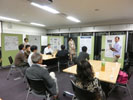
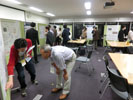
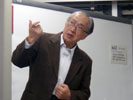
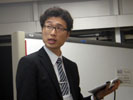
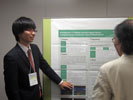
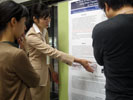
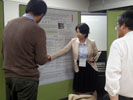
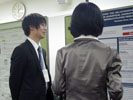
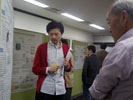
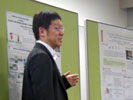
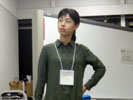
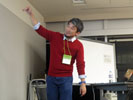

 HOME
HOME 前のページへ
前のページへ